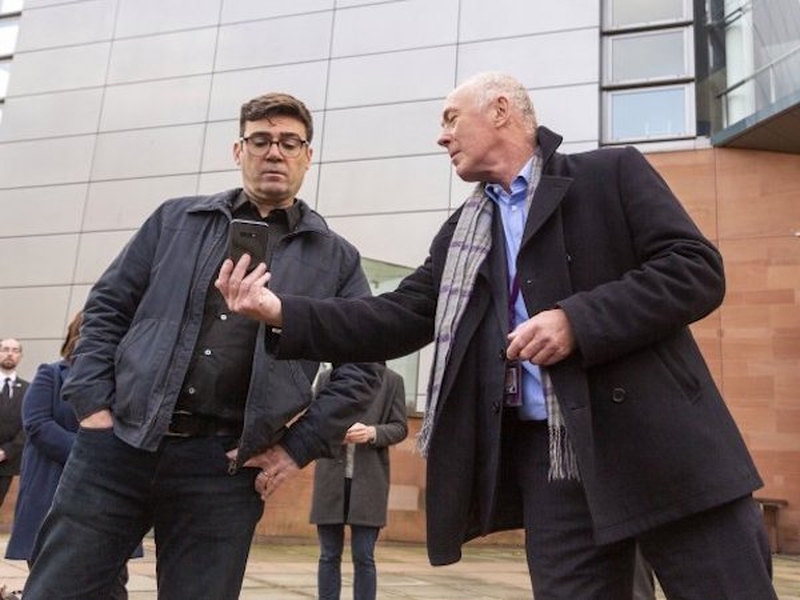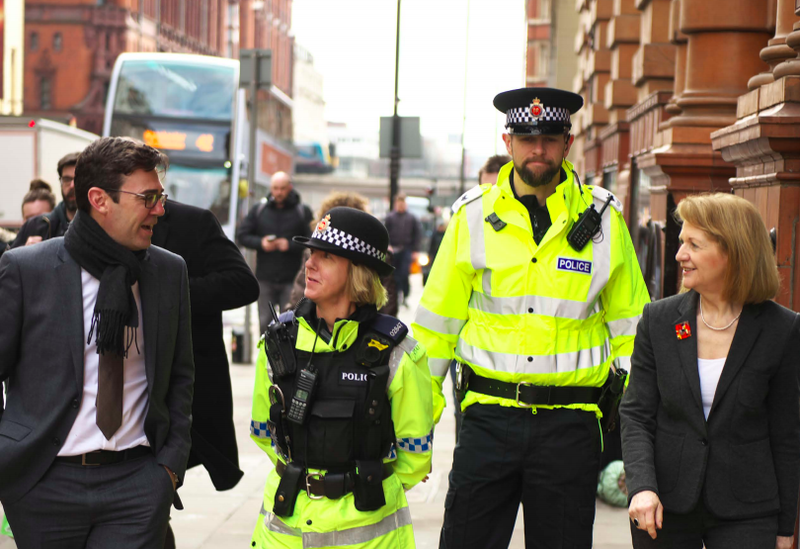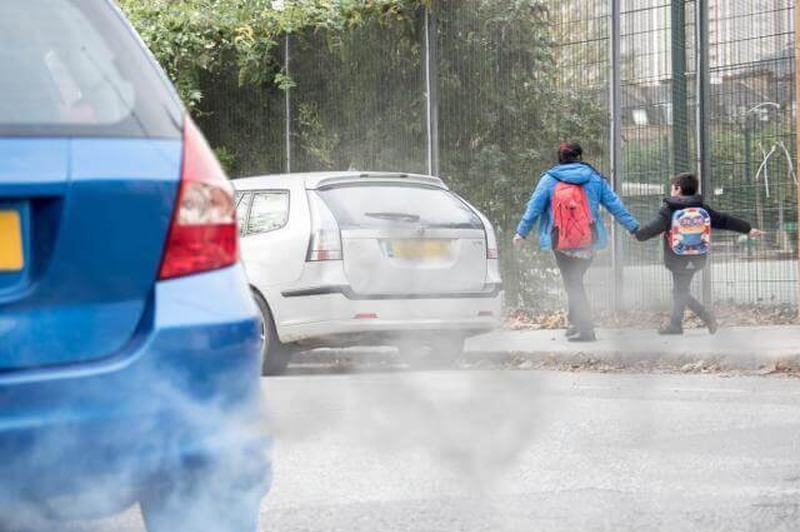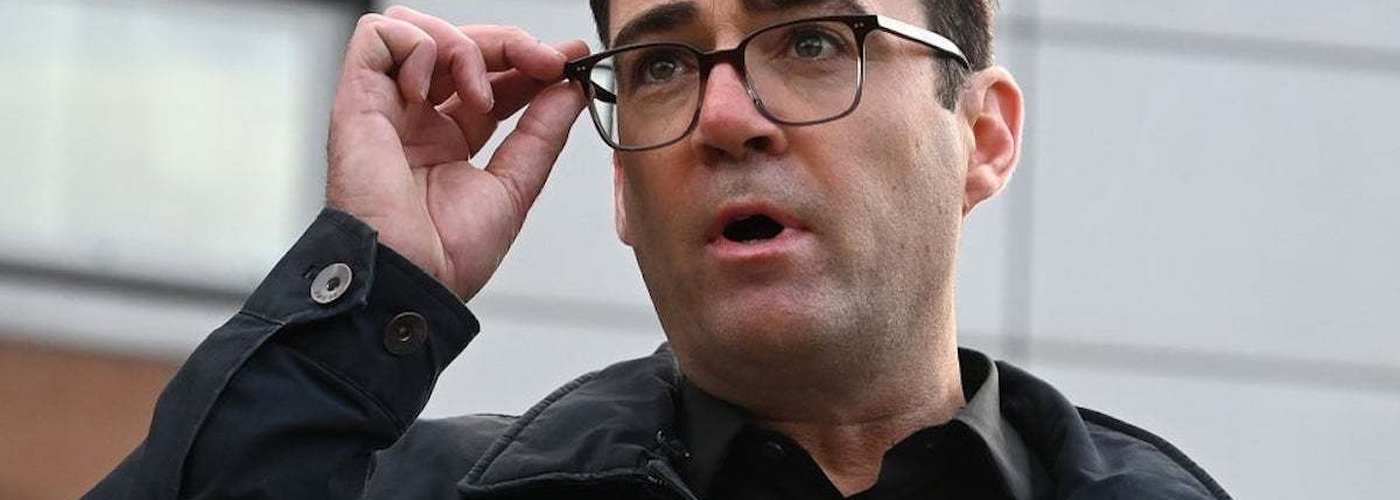The Labour Mayoral Candidate speaks to us about lockdown, leadership and calling out the government
“Genuinely I didn't manufacture that situation,” says Andy Burnham.
I'm talking - briefly - to the incumbent mayor of Greater Manchester (and Labour's candidate for the next mayoral election) at his recent manifesto launch in the Ducie Street Warehouse.
The "situation" was the moment that Andy Burnham graduated from reasonably prominent politician to local hero. Rejecting the Government's offer of £60m in support he said at the time: "It is wrong to place some of the poorest parts of England in a punishing lockdown without proper support – to do so will cause job losses and business failure."
You cannot have real devolution if it's all about biting your tongue
Burnham accused the Government of sacrificing Greater Manchester to an experimental plan that favoured and protected the south.
While political wrangling might not usually capture the public imagination, the idea of the mayor standing up to Boris & Co certainly tugged on some tribal heartstrings in a way that has filtered into popular culture.
After all, not every politician has their own graphic avatar by Stan Chow to use on their election material or a beer named “King of the North” in their honour.
It's this cultural penetration - the image of the bespectacled Mayor on the steps of the Bridgewater Hall - that Mr Burnham and his team must be hoping will cut through the pre-election wrangling, especially over sore-point issues such as policing and the clean air zone.
The speechifying at that time was powerful. Whoever Andy Burnham’s speechwriter is, they combine an Aaron Sorkin over-the-top emotivity with a fiery Ken Loach sensibility. It wouldn’t surprise me if that person was Andy Burnham himself.

A Northern kind of populism?
It’s a moment he comes back to often but not in a triumphant way. Instead, he seems more worried that people won’t believe it was a moment of the heart.
When I asked Andy Burnham if he thought positioning himself as anti-Westminster was a deliberately populist move, I was thinking of the success of Boris Johnson and Nigel Farage branding themselves as anti-elitist everymen puncturing the Westminster bubble. Or even Trump's self-image as a kind of anti-establishment renegade. Politically opposite, without a doubt, but the "outsider" patter is not so different.
But his mind moved straight back to the moment on the steps:
“I can hand on heart tell you that there were meetings with other mayors from around the country, Conservative mayors as well, where publicly I was saying ‘let's resolve this'. I'll accept tier-three but don't do it without the right support because we've been under restrictions longer than anyone else.
“I honestly don't believe they had given that a thought. They didn't really think about what it was like to be under restrictions from the summer onwards last year – well we never really were out of them - and I got more and more angry about that because it was just as though ‘oh well, they'll just have to fall into line’.
“The point of devolution is not to accept something if it's wrong, and it was wrong in my view to do what they were doing, which was just a bulldozer arrangement where the lowest paid would have been quite severely short of money.”
Devolution deal goes south
The received opinion now is that the Conservatives, who birthed the Northern Powerhouse, have gone cold on the idea. Instead of handing over power to metro mayors who then don’t toe the line, precious funding is heading out to small to medium-sized towns whose values, Conservatives believe, are more in line with theirs.
Not many towns in Greater Manchester get a look in (Bolton and Cheadle get a bite of the Towns Fund pie but not much else). If Andy Burnham wins this Thursday, he’ll need a very comfortable majority, and a decent turnout, to prop him up in the face of government indifference.
Burnham is aware he needs devolution to go further.
“The main political parties need to get more serious about the sentiment in the north. Levelling up by just scattering a bit of money here and there - that isn't levelling up. Saying Canterbury's a higher priority of levelling funding than Salford..." he trails off, astonished that anyone could think Canterbury is more in need of funding than Salford.
“You cannot have real devolution if it's all about biting your tongue," he continues. "Going on bended knee, you know, always bowing down. It only works if when something is wrong, it's a genuine issue, that there is an ability to stand up to it."
“And to the idea of Government afterwards saying ‘oh we're going cold on devolution because someone happened to have the nerve’, well that tells you what's wrong here. The system is saying we want to control everything we want to dictate everything, and it shouldn't be like that.
“I think the brilliant warm, generous, amazing people here in Greater Manchester deserve better than the treatment they've had out of successive Westminster Governments. This place could be even more than it currently is. If it was given more ability to do more for itself, and it got equal treatment with London, it would be an amazing change for people."
@stan_chow posters being proudly displayed across our region. People across Greater Manchester are sharing their support for @AndyBurnhamGM for this Mayoral Election on 6 May.#GreaterManchester #VoteAndy #AndyforMayor pic.twitter.com/tK2IOgBhJ5
— Andy For Mayor (@TeamBurnhamGM) May 3, 2021
But is this position too deliberately antagonistic? Some might say that Burnham's stand has cost Manchester dearly.
“I don't want to position this as I'm just here to take stands against the government. I've always said in this role, if they do something right, I will say so and I can point to over the last four years things where I've said that.
“Because I've been in politics 20 years now as an elected representative for Greater Manchester I know how to call something out that's wrong. I won't make any apologies for doing that vociferously. I can be a stronger voice for this place, but not to be a bit of a loudmouth for the sake of it. The way I work in politics these days - and I got more and more into this approach the longer I've been in it - don't go off on everything, where something is properly wrong call it out and call it out as effectively as you possibly can.”
Lessons of leadership
Since then, many people have speculated that Andy Burnham is biding his time for yet another leadership bid (he has put himself forward to be the leader of the Labour party twice previously). It is notable that every time he is asked whether he will go back to Westminster, he doesn’t rule it out, despite his strong antipathy towards the place.
In fact, it is in at least one of those failed leadership bids that we might detect a moment of quasi-spiritual crisis for Andy Burnham. During the 2015 Labour leadership contest, which Jeremy Corbyn eventually won, a pivotal moment came over a welfare bill in which the government lowered the household benefit cap.

While the other contenders for the leadership said they would abstain, Jeremy Corbyn unreservedly rejected the bill. Despite previously describing the welfare bill as “unsupportable”, Burnham wrote a letter to Labour MPs to tell them he would abstain, stating that collective responsibility was important.
He was later to regret that decision, when Labour party members responded with more sympathy to Corbyn’s principled attitude over Burnham’s vision of cohesion, with one party member commenting, “I was going to vote for Burnham but his abstention on this bill is the same as voting for it in a cowardly way,” and another calling him “middle management material”.
While the experience may have emboldened Burnham to take more righteous stands in his political life, the yearning for cohesion is still a devil on his shoulder. Take the recent football protests. As police and crime commissioner he commented that “there is no excuse for the actions of a minority who injured police officers”. The football fan in him though, who has recently launched a five-point action plan on transforming the game after the Super League debacle, said: "I fully understand the longstanding concern of Manchester United supporters about both the ownership and financing of their club and the wider running of football."
Just like a politician, you might say, but it seems to be more than that. Wanting everyone to get along and believe in the same vision. Wanting to be both pro-business and environmentally sound, to clean up the air but not penalise private car owners, to support police and protesters at the same time. Perhaps you can't always walk the middle path but Burnham is determined to try.

Calling out his own side
This people-pleasing attitude was on show at the recent joint Jewish Leadership Council-Jewish Representative Council hustings for example. There, Burnham was happy to play on his selling point as a cabinet-experienced politician. I put it to him that this might seem contradictory given his position on Westminster politics.
“I do believe this role is a cabinet-level role. I said it four years ago and I got criticised for saying so, I absolutely still believe it's demanding on every single level, and it's true I've never worked harder. Westminster creates that famous bubble – an insulation around people that makes it easier, they're not under the same pressure.
"I like working by being directly in touch with people but it's demanding, really demanding. The experience I had in the cabinet took me through the pandemic for instance. But I also said at that hustings that I've also been prepared to call up my own side over issues such as anti-semitism, which I did.
“This role does suit me a lot more. I personally believe the longer you stay in Westminster, the more it makes a fraud out of you. It has you saying things and voting for things you may not 100% agree with, but that's the way it works, party whip and all of that."
“I think that erodes that connection people have with politicians because they see someone on the media and think - does that person really believe what they are saying? And I just came to a point where I had fallen out of love with that whole way of doing things. And I think that we're building here is a genuinely different and better way of involving people in politics, not just making party politics more attractive to people. It's about involvement.
“I was listening to people and taking their ideas and then making them real. A Bed Every Night [a programme for eradicating rough sleeping] came from a Methodist Reverend within the city region. That's the purpose of devolution – to open up. Open up power to a much broader range of people, and use it collectively.
“Too much power is concentrated in that single postcode down in London, and I've seen it myself - vested interests swirl around that place, an unhealthy relationship at times between politicians and the national media. The proximity of big money. If you've got power in the hands of too few, I think you've got the conditions for it to be misused. You can do the opposite, you can break out power to a lot more people, and I think it's healthier and better. We are a work in progress."
Who knows how much longer Andy Burnham will be in this job? Perhaps just a few more days, if he is ousted by one of his rivals. Perhaps many more years if voters retain a sentimental fondness for the King of the North, or maybe just until the day Westminster comes knocking at his door again. Until then he seems determined to be a voice for the city.
You can read Andy Burnham's manifesto in full at www.andyformayor.co.uk
Read now: Interview: Laura Evans - 'Policing is the basic foundation of everything'
Read again: Manchester Mayoral and council elections confirmed for May
So what's in Andy Burnham's manifesto?
Creating a London-style transport system by bringing buses under franchise and expanding the Bee network by bringing train stations under public control
Lowering carbon emissions through carbon budgeting, hitting zero-carbon by 2038
Building the country’s largest network of safe, segregated infrastructure for walkers and cyclists
Make transport accessible for disabled people by 2025
Creating a new Digital Action Network and help put all under 25s and over 75s online
Prioritising mental health and create a wellbeing service based on social prescribing
Creating green jobs by retrofitting homes
Introducing a Greater Manchester Good Landlord Charter
Bring more private homes in social housing
Introducing a Good Employment charter and linking it to public procurement
Working towards making Greater Manchester the UK's first Living Wage city region












